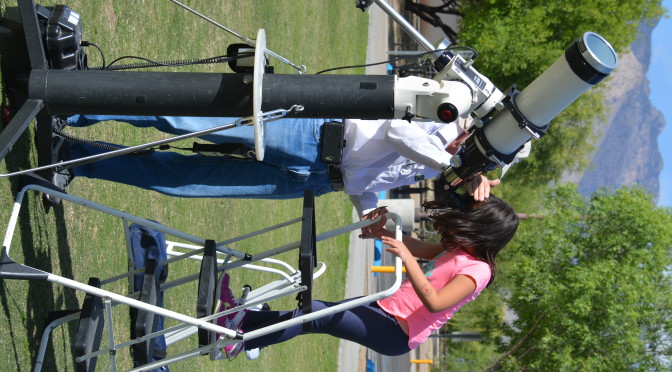TOPIC FOR THE AUGUST MEETING IS STILL TO BE DETERMINED.
Reminiscing Remnants
Searching for Diamonds in the Celestial Haystack
An AFSIG article by Paul Trittenbach
A long time ago there was a violent explosion and nearly nothing was left in its wake! A supersonic shockwave roared from the heart of the explosion and debris was hurled in every direction. There were no known witnesses to the great cataclysm. If anyone was around at the time, there would’ve been no survivors. All we have is the forensic evidence that tells us of a violent and horrible death.
When Shakespeare wrote of the struggles of humanity he could have just as easily been penning an exposition on the stars. Destruction and creation are part of the cycle of the universe. They are also the fabric of our literature and movies. There are those who burn out quickly but are remembered in legend because they shined so brightly. There are those who live long, moderate lives and die with little more than a stellar last gasp. And there are those that convulse before dying in powerful explosions, building monuments to their lives.
As our earth races around the sun and turns to face the summertime stars,
a dense murky patch of clouds and dust whorl overhead. We are facing in, through the Scutum-Centaur and Sagittarius arms of our galaxy, into the bowels of the Milky Way. Of the constellations that reside there, one of them, Sagittarius, is the focus of our attention this month. Here reside a couple of monuments to the lives of stars that once burned brightly. They are also popular summertime targets for amateur stargazers.
When Charles Messier cataloged M8 he was penning it into his list of celestial objects to avoid. It became one of 109 objects that were relegated to his “don’t see” file, but I recommend that you go there even if you have been there before. Messier 8, or M8, or the Lagoon nebula is an enormous interstellar cloud of gas and dust, the remains of the star that once burned brightly. It is classified as an emission nebula. Nebulae of this type are described as localized regions of ionized gas which emit light at various colored wavelengths, most of which are not visible to the human eye. M8 is located approximately 5200 Light years (ly) from our solar system and occupies a space of 140 ly high by 60 ly across.
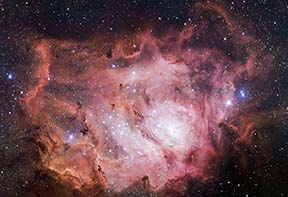
M8 appears pinkish in color in time-exposure images, a flower in the celestial garden. This is due to ionized hydrogen (HII). But to our eyes M8 appears gray in color. This corresponds to the doubly ionized oxygen present and accounts for why the nebula is more vivid when viewed with an O III filter. The gases emit colors because they are ionized by the ultraviolet light emitted from an energetic white dwarf — the beating heart of the nebula. Hubble Space Telescope (HST) images show details of swirling twisters of gas and dust moving throughout the nebula. These twisters of dust and gas are the result of the difference between the hot and cold areas of the gases themselves.
Nature dictates that in order for a celestial mother to give birth it must die. In this case a violent explosion rips apart a star to create nebula which becomes a stellar nursery. M8 is also a complex of multiple structures — including a large open star cluster NGC 6530, Herschel 36 — the star that drives the nebula — and the Hourglass. NGC 6530 is a young, loose star cluster — most likely created within the nebula itself — composed of 50 – 100 young stars about 2 million years old. Off-center within the nebula is the Hourglass, a bright feature which appears to be a star forming region.The dark regions of the nebula are Bok globules, protostellar matter which under accretion forms the new stars in this nursery.
Our next flower in the celestial garden is Messier 20. M20, the Trifid nebula is next door to M8, astronomically speaking. Its name is derived from the three-lobed structure of the nebula. The Trifid nebula is a bonanza among nebulae — composed of three nebulas in one. The Trifid nebula is located at the same distance from us as M8 and astronomers believe that the two are closely associated, perhaps developed of the same origin. Like the Lagoon nebula M20 is a cocoon of interstellar gas and dust, and a stellar nursery.
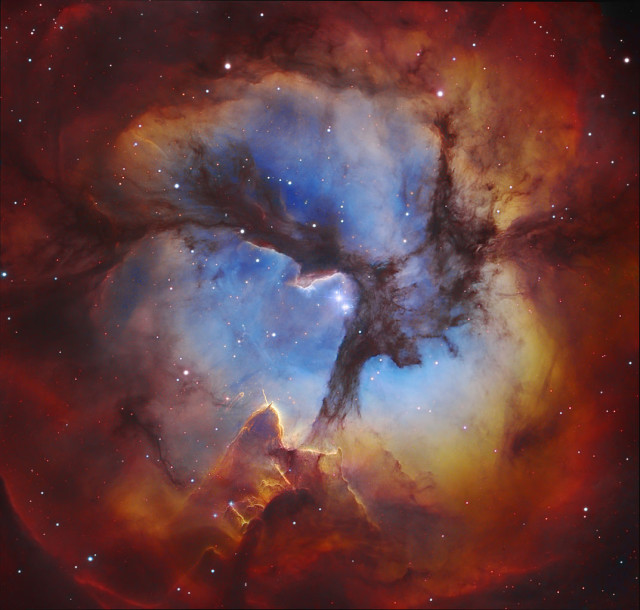
This complex of emission, reflection and dark nebula is a combination of ionized gases of hydrogen, sulfur and oxygen. As with M8 this nebula appears gray to our eyes and images reveal a blue reflection nebula and red emission nebula nested together. Again, an O III filter will enhance the visual details in the telescope. The three lobes of M20 are separated by the lanes of a dark nebula, Bernard 85. Clouds of protosetllar Bok globules, through the influence of gravity, accrete to form new stars. But new stars currently being born within M20 are likely to never mature because the star that fuels the nebula is eroding away and will be unable to continue powering the nebula and its stellar hatchery.
Images by the HST reveal fingers of Bok globules amid dust and clouds within the nebula and the embryonic stars being created within. Detailed analysis in various wavelengths of light reveal that in these nearly opaque, cold clouds of protostellar matter material is metamorphosing into nascent stars; the term cocoon seems apropos. We will not be able to reveal these details with our telescopes but understanding the mechanics of the subjects in our eyepieces only adds one more piece to the vast cosmic puzzle. I also believe it makes our stargazing more interesting.
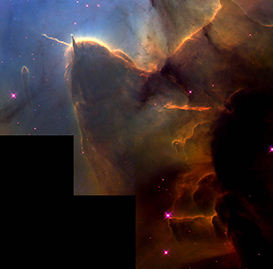
Binoculars and a telescope of any size will allow you to view M8 And M20. Take your time to look for the details in the wispy clouds of this nebula. Vary your magnification to tease out details and get a better look at features such as NGC 6530 in M8. Dark skies are always best for separating details so take advantage of our CAC or TIMPA facilities. And on all of those nights when the weather prohibits stargazing take the time to revisit these targets in your thoughts — stroll through the celestial garden and reminisce the remnants.
General Meeting – August 2016
Our August 5th speaker will be Dr Vishnu Reddy from the Planetary Science Institute and the UA Lunar and Planetary Lab. He will present an overview of the Dawn mission and key science results from Vesta and Ceres. He’ll also tell us how amateur astronomers can help monitor variations on Ceres between now and perihelion.
Astronomy Fundamentals Meeting – July 2016
Equipment Presentation: Push-to Dobsonian
I have added the altitude encoder and the controller box to my 8 inch Orion SkyQuest Dobsonian. I will demonstrate how a “Push to”, sometimes called “Digital Setting Circles”, mount works.
Constellation of the Month
The “Constellation of the Month”, TBA, will be presented by Joe Grisillo. I am looking for people to present future “Constellation of the Month”, whether it is a favorite or a constellation you would like to learn more about.
General Meeting – July 2016
Astronomy Essentials Presentation – 6:30 PM
Summer Night Sky
Mary Turner, our appointed Chief Observer, will take us on a tour of the Summer night sky. We may be entering the monsoon season but the sky usually does clear once the storms pass through. Mary uses astronomical data, images and mythology, to bring the summer night sky to life.
Main Presentation – 7:30 PM
A Tale of a Tipping Moon, Recorded in Lunar Ice
James T. Keane, Lunar and Planetary Laboratory, Department of Planetary Science, University of Arizona
Saturn
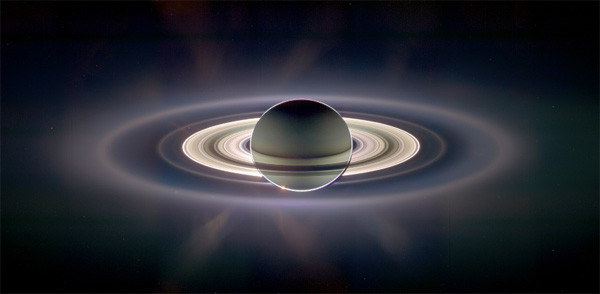
Finding a Diamond in the Cosmic Haystack
An AFSIG article by Paul Trittenbach
Located 1.4 billion kilometers (9.6AU) from the Sun is the second largest planet and sixth planet of the solar system: Saturn. Its beautiful ring structure makes it the most popular planet among amateur astronomers and the public alike. Like Jupiter, Saturn is a gas giant planet composed predominantly of Hydrogen and Helium.
Saturn was the most distant planet known to the people of the ancient world. It was not viewed through a telescope before 1610 when Galileo Galilei turned his 30-x refractor upon it. To his amazement, he saw a pair of objects on each side of the planet, and sketched Saturn as a three-bodied world. After numerous observations, he sketched these lobes as handles attached to either side of the planet.
In 1659 the Dutch astronomer Christian Huygens, using a more powerful telescope than Galileo’s, proposed that Galileo’s handles were in fact a thin flat ring that surrounded the planet. Later in that century, in 1675, the Italian born astronomer Jean-Dominique Cassini observed the division between what are called the A and B rings of Saturn. It is now known that the gravitational influence Saturn’s moon Mimas is responsible for this 4,800 mile-wide division, known as the Cassini division.
Saturn’s volume is 755 times greater than that of Earth. The winds of the planets’ upper atmosphere can reach up to 500 m/s, four and half times the speed of the fastest hurricane on Earth! Combined with heat rising up from the planet’s interior, these winds create the yellow and gold bands of the atmosphere. A day on Saturn lasts 10.7 hours and one year is equivalent to 29 Earth years.
Saturn’s rings are composed predominantly of water ice. The rings contain more than 23 times as much water as all the oceans of Earth. They consist of seven separate ring structures extending up to 282,000 km from the planet; about three quarters of the distance between Earth and the moon. The depth of the ring system is approximately 10 meters.
Saturn has 62 known moons. The largest moon, Titan, is bigger than the planet Mercury and the second largest moon in the solar system (only Jupiter’s Ganymede is bigger). Titan has a thick nitrogen atmosphere, similar to the early atmosphere of Earth. On Titan, the cold atmosphere causes methane — a normally gaseous compound on earth — to precipitate out of the atmosphere as rain. Titan has large lakes of methane and planetary scientists are interested in it because of its potential to harbor basic life. Further study of Titan may help scientists to better understand early Earth. Titan is the only other moon in the solar system where NASA has landed a probe.
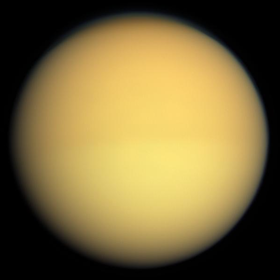 Saturn’s moon Titan was discovered by Christian Huygens in the year 1655. Giovanni Cassini followed up with the discovery of the next four moons: Iapetus, Rhea, Dione and Tethys. In 1784 William Herschel discovered Mimas and didn’t sell at this. More than 50 years had passed before the discovery of Hyperion and Phoebe. As the size and resolving capacity of telescopes increased, so too did the number of discoveries of new moons around Saturn. Additional discoveries came via robotic probes, such as the Cassini mission earlier this century.
Saturn’s moon Titan was discovered by Christian Huygens in the year 1655. Giovanni Cassini followed up with the discovery of the next four moons: Iapetus, Rhea, Dione and Tethys. In 1784 William Herschel discovered Mimas and didn’t sell at this. More than 50 years had passed before the discovery of Hyperion and Phoebe. As the size and resolving capacity of telescopes increased, so too did the number of discoveries of new moons around Saturn. Additional discoveries came via robotic probes, such as the Cassini mission earlier this century.
Iapetus is a two-faced world — having one side that is highly reflective and as white as snow and another side as dark as black velvet. Mimas has an enormous impact crater on one side that nearly split the moon and half. The moon Enceladus has a fractured surface where water can escape, through evaporation, into the atmosphere. This displays evidence of active volcanism on the planet. Phoebe and several other moons, orbits retrograde to the planet. Sixteen of Saturn’s moons orbit and a tidal lock with the world, always keeping one face toward the planet.
Studies by NASA’s Cassini probe indicate that Saturn has a dense core of rock and ice, solidified by Saturn’s intense pressure. The core is surrounded by a metallic liquid hydrogen layer — similar to that of Jupiter, but considerably smaller. Saturn’s magnetic field is 578 times as powerful as that of Earth, but still smaller than Jupiter’s.
The rings, and most of the moons lie totally within the influence of the planet’s magnetosphere. The magnetosphere is a magnetic field surrounding a planet, where electrically charged particles of the solar wind interact with the magnetic fields of the planet. This is the area in which planetary auroras are created.
Saturn can be easily observed through a small telescope, making it accessible to anyone. The deadline for our observing season, however, may be closing within the next month as monsoons begin to dominate our southwestern sky. The planet reaches opposition on the morning of June 3 at 1:00 AM. But any time throughout the month of June and the entire summer will be good for seeing the planet, which is available to us until October.
Star Party-Desert Museum
Star Party-Sonoran Desert Museum
FAR WEST TUCSON
Setup: 6:00 pm
Observing: 7 – 9 pm
Viewing Location: TBD
Estimated # Participants: 250
Age/Grade: Grades All Ages
# Scopes Required: 2
Other Activities: Desert Museum Cool Summer Nights program
TAAA POC: Jim Knoll
Star Party-Desert Museum
Star Party-Sonoran Desert Museum
FAR WEST TUCSON
Setup: 6:00 pm
Observing: 7 – 9 pm
Viewing Location: TBD
Estimated # Participants: 250
Age/Grade: Grades All Ages
# Scopes Required: 2
Other Activities: Desert Museum Cool Summer Nights program
TAAA POC: Jim Knoll
Mercury Transit Across the Sun
A rather rare event will be happening on Monday May 9 — Mercury will appear to move across the face of the Sun. For us in Tucson, the transit will already be underway when the Sun rises at 5:32 am. The Tucson Amateur Astronomy Association (TAAA) will have several Solar Telescopes set up at Brandi Fenton Memorial Park starting about 7:30 am. We’ll be there until at least 10 am, but will hang around as long as there are people interested in viewing the Transit. The Mercury Transit will end at 11:39 am Tucson time.
Mercury Transits are fairly rare, with only 13 or 14 per Century. The last Mercury Transit was November 8, 2006 and the next one will be November 11, 2019. After that, we’ll have to wait until 2032 for the next one. Mercury Transits only happen within a few days of May 8 or November 10 of any given year. The reason they don’t happen every year is because Mercury’s orbit is inclined 7 degrees to Earth’s Orbit, so most of the time, Mercury transits just above or below the Sun from our perspective.
Join TAAA at Brandi Fenton Memorial Park on Monday May 9th to view this rare event.
Jim Knoll
Astronomy Festival for National Astronomy Day
Join the Tucson Amateur Astronomy Association (TAAA) on May 14th, from Noon to 9 pm at Brandi Fenton Memorial Park to celebrate National Astronomy Day. This will be a fun-filled day and evening for the entire family. We will have solar telescopes for safe viewing of the Sun and interactive exhibits for everyone during the afternoon. There will be telescopes for viewing deep sky objects in the evening such as Jupiter, star clusters, galaxies, nebulae, and Mars (late evening). We will have a door prize drawing at 7 pm for a 50mm telescope (must be present to win) and a Walk Around the Night Sky presentation around 7:30 pm. The complete schedule is below.
Schedule
Safe Solar Viewing of the Sun Noon – 6:30 pm
Interactive Astronomy Exhibits Noon – 6 pm
Make Pocket Solar Systems & Sun Dials
Make an impact crater
Door Prize Drawing (must be present to win) 7 pm
50 mm Refractor Telescope
Night Sky Viewing 7:30 – 9 pm
Walk Around the Night Sky Presentation 7:30 pm
Help with personal Telescope All Day/Evening
Bring your personal telescope to receive
assistance in setup & operation
Jim Knoll


